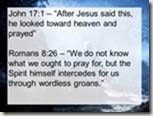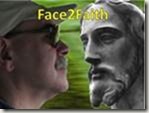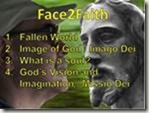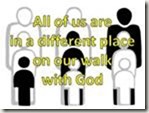Special Thanx to Dr. Thomas Long of Candler School of Theology for giving me an idea for this message during preaching seminar held at Camp Pecometh on June 29, 2013

It takes a lot of chutzpa to imagine something different. It takes a lot of faith to follow through on our dreams and not to get sidetracked.
We all have complex and nuanced reasons why we have faith, but most of us offer simplistic explanations of faith or why we have faith because we are no longer challenged to think about faith and our place in God’s Creation. Instead our culture is more than happy to drown our very souls in a cacophony of materialistic drivel. I heard that idea last week in Camp Pecometh from a 21 year old counselor. I hope that one day he will earn his theological degree, become a professor in a seminary and write lots of books.
Speaking of Pecometh; a 12 year old camper asked me “how do we purify our souls when they become polluted by sin.” Upon digging a little deeper we discovered that she had very complex and valid reasons to ask that question.
We are in the middle of the Face2Faith series where we look at some of the basic ideas of our faith. Last Sunday we talked about Souls and what it means that we have a soul. We talked about our souls being a “spiritual organ” that connects us to God; we talked about what happens when we injure our souls by sin and what we can do to heal and to nurture our souls.

Today being the Sunday closest to USAmerican Independence Day, I want to talk about imagination and vision. Every one of us is created in the Image of God. In John 4:24 we learned that “God is Spirit,” and therefore we are created as spiritual beings. Being created in the image of God means that we have the ability to love, to think, to reason, to appreciate beauty, to create, to understand abstract concepts, to exercise freedom of will, mercy and justice, and to seek a relationship with our Creator.
Today’s Gospel reading seemingly has nothing to do with Independence Day. But it has more to do with Independence Day than we realize.

Today’s reading comes from the portion of Scripture that deals with Jesus’ early ministry. In Chapter 1 of Mark we learn that Jesus started his ministry, that he recruited some disciples and that he healed some people – he started by rebuking an evil spirit out of a man in Capernaum (Mark 1:21-28), then he healed Peter’s mother (Mark 1:29-31) and finally he “healed many who had various diseases” (Mark 1:34).
All that happened in the area near Capernaum.
It is draining and tiring to heal souls. It takes a lot of energy and concentration. It takes strength to look evil in the eye and to expose it for what it is. Jesus was tired. So the next morning, He decided to take some time for himself and went up on a hill. Jesus went where his cell phone did not work, where there was no internet and where nobody could find him.
There is a lot to be said for determination. The Disciples found Jesus and told him that Capernaum is afire with the news of what Jesus did yesterday. I suspect that they even suggested that it would be a good time for Jesus to think about running for a political office, his polls were up and everybody liked him. Jesus was a shoe-in for the next mayor and rabbi of the largest synagogue in town. That is what the Disciples knew about leadership and about what it meant to be a leader in their world.

It takes a lot of chutzpa to imagine a different world and Jesus had it. Jesus could very easily have chosen to go to Capernaum and become a well-respected rabbi in the town, to become a leader in the community. Jesus could have very easily settled in Capernaum and have a productive life there. But it is not what Jesus did. Instead Jesus said, “Let us go somewhere else—to the nearby villages—so I can preach there also. That is why I have come…” (Mark 1:38).

Instead of going to Capernaum, Jesus traveled throughout Galilee, preaching in their synagogues, bringing the Good News of the world that could be, telling us what role we could play in that world and helping people to live better lives.
We are defined by our stories. How different our Christian Story would be if Jesus had made the decision to settle there in Capernaum instead of going throughout Galilee. If our Christian story was different, we would be different because we would have a different understanding of what is right, true and beautiful.

Shortly before the end of the Revolutionary war (which started on April 19, 1775 and ended on September 3, 1783), George Washington was the most powerful man in the nation. He was a successful military leader, progressive thinker and in control of an army devoted to his leadership. Throughout the history of mankind and up to this point, strong political men usually grasped for power when an opportunity presented itself. In the eyes of many, George Washington was poised to use his command of the army and devotion of his troops to seize power for himself.

On May 22, 1782, one of Washington’s high ranking officers, Colonel Lewis Nicola, wrote to him expressing an opinion that the republican form of government demonstrated itself to be ineffective. Colonel Nicola proposed that Washington become King of the United States. That letter later became known as the Newburgh Letter.
It takes a lot of chutzpa to imagine a different world and George Washington had it.

Without wasting any time, George Washington replied to Colonel Nicola the same day, stating that he had read Nicola’s letter “with a mixture of great surprise and astonishment.” Washington continued: “no occurrence in the course of the War, has given me more painful sensations than your information of there being such ideas existing in the Army as you have expressed, and I must view with abhorrence, and reprehend with severity.” Washington wrote that he could not think of anything in his own conduct that would suggest that he would consider being king. “You could not have found a person to whom your schemes are more disagreeable.”
It takes a lot of chutzpa to imagine a different world and George Washington had it.
Washington concluded by asking Nicola to never again consider the idea of monarchy: “If you have any regard for your Country, concern for yourself or posterity, or respect for me, to banish these thoughts from your Mind, and never communicate, as from yourself, or any one (sic) else, a sentiment of the like Nature.”

It was not unusual that Nicola would prefer a king to self-government, especially considering the ineffectiveness of the Continental Congress during the war. Furthermore, throughout history, monarchies were much more common and successful than self-governing republics. What was unusual was Washington’s response. Not only did he refuse to be king, but he rebuked Nicola for even suggesting the idea. Washington’s harsh words resulted in three apologies by Nicola over the next three days.
How different the story of our nation would be if George Washington became a king? How different our national identity would be if we were subjects of a monarchy instead of citizens of a republic?
When was the last time you faced a personal cross-roads and chose the road less traveled because you had courage to imagine a different world?

{Open the Altar}
Works Cited
Institute, The Claremont. “Rediscovering George Washington.” 2002. PBS.ORG. 02 07 2013 <http://www.pbs.org/georgewashington/classroom/rule_of_law2.html>.
 Daily Bible Verse
Daily Bible Verse





















































